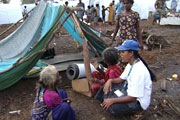 Secretary-General Ban Ki-moon is sending the United Nations’ political chief, B. Lynn Pascoe, to Sri Lanka tomorrow for talks on critical issues, the UN announced today.
Secretary-General Ban Ki-moon is sending the United Nations’ political chief, B. Lynn Pascoe, to Sri Lanka tomorrow for talks on critical issues, the UN announced today.
Mr. Ban and the Sri Lankan President, Mahinda Rajapaksa, agreed on the mission during a telephone conversation today, Mr. Pascoe told a press briefing.
“We are very concerned about the pace of progress,” Mr. Pascoe said. “The Secretary-General was there, and a series of commitments was made… including on the movement of people out of camps and including an eventual political process and some kind of accountability mechanism.”
He added that he also intended to discuss the continued detention of two UN staff members, and the decision by the Sri Lankan authorities to expel UNICEF spokesman James Elder.
Mr. Pascoe said the Secretary-General and Mr. Rajapaksa had spoken “quite openly and straightforwardly about what should or should not be done.” Ban had proposed sending Mr. Pascoe out “fairly quickly to deal with follow-up issues.”
“President Rajapaksa agreed and so I’ll be on the plane tomorrow with a small team… to work from where we are on what are critical issues out there,” he said.
Mr. Pascoe reviewed the work of the UN Department of Political Affairs at the briefing, noting that its missions were often “sensitive and lower-profile” than the UN’s humanitarian work, because sometimes the chief actors involved did not want its efforts to be publicized. He gave special mention to countries including Nepal, Myanmar, Somalia and Cyprus, and to the peace process in the Middle East.
Mr. Pascoe said that while Nepal was a positive story of a country in transition, he believed the process remained “quite complex” and the UN was still involved, particularly on the movement of former combatants out of camps. “We would like to work ourselves out of a job there, but we would like to work ourselves out of a job because everyone can proclaim success, and we can move on to the next stage,” he said.
Mr. Pascoe also recalled the Secretary-General’s efforts to engage with the authorities in Myanmar. “We are not at all satisfied with the reaction,” he said. “We have not seen enough progress on that issue, and we certainly will be discussing that… during the General Debate, both with the Prime Minister when he’s here, and with the Friends of Myanmar.”
On Somalia, Mr. Pascoe said that just 18 months ago, the international community had been trying to ignore the country’s problems, but the Secretary-General had found this “morally unacceptable” and “way outside what the UN’s role and job should be.” He had instructed DPA to start a peace process going and to move it forward. Since then, the Djibouti process and the withdrawal of the Ethiopian armed forces had taken place, together with the formation of an inclusive Government.
“The international community has now become very active in trying to provide assistance both to the Government and to building structures in Somalia over the long term,” Mr. Pascoe said. He added that although there would be further obstacles to overcome, “if you look at where we were when we started this process a year and a half ago, and you look where we are now, I think it’s quite fair to say that the process has moved forward, and we will do everything we can to help it succeed.”
(For updates you can share with your friends, follow TNN on Facebook and Twitter )
